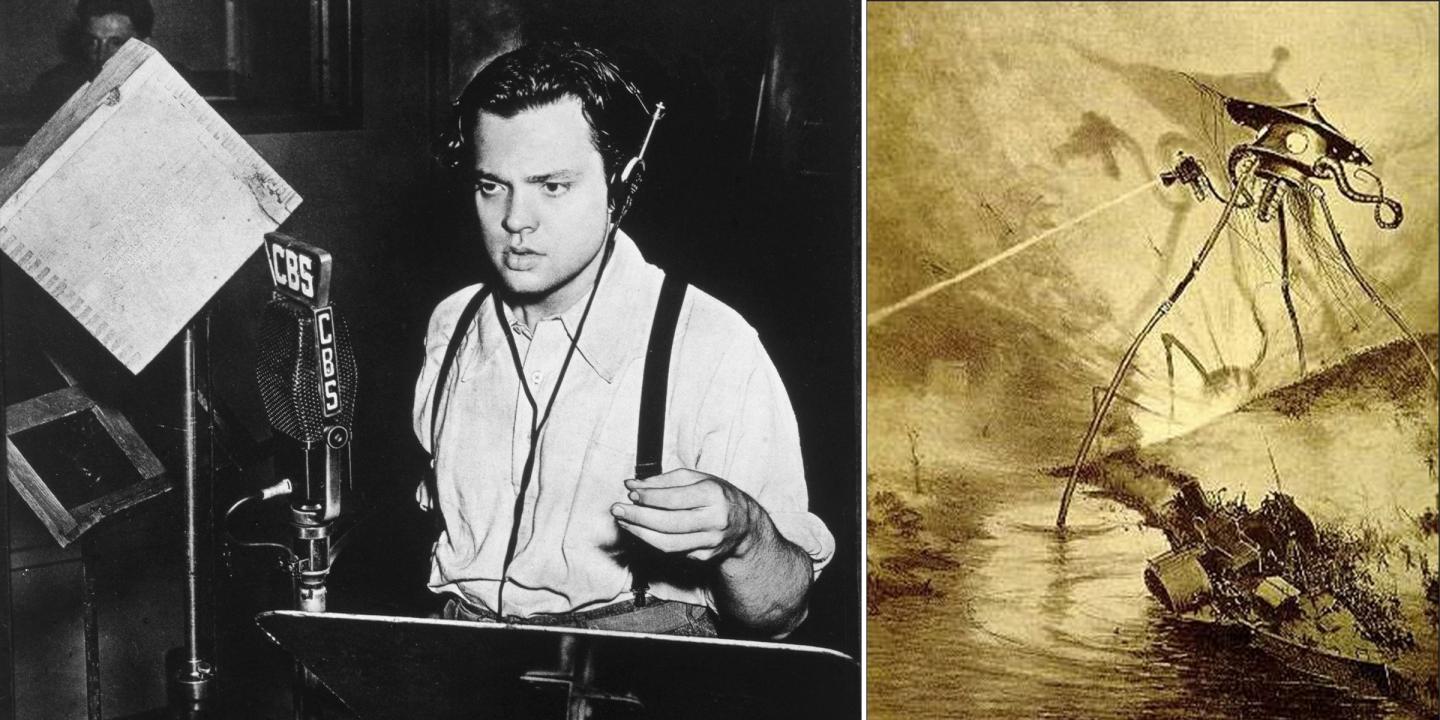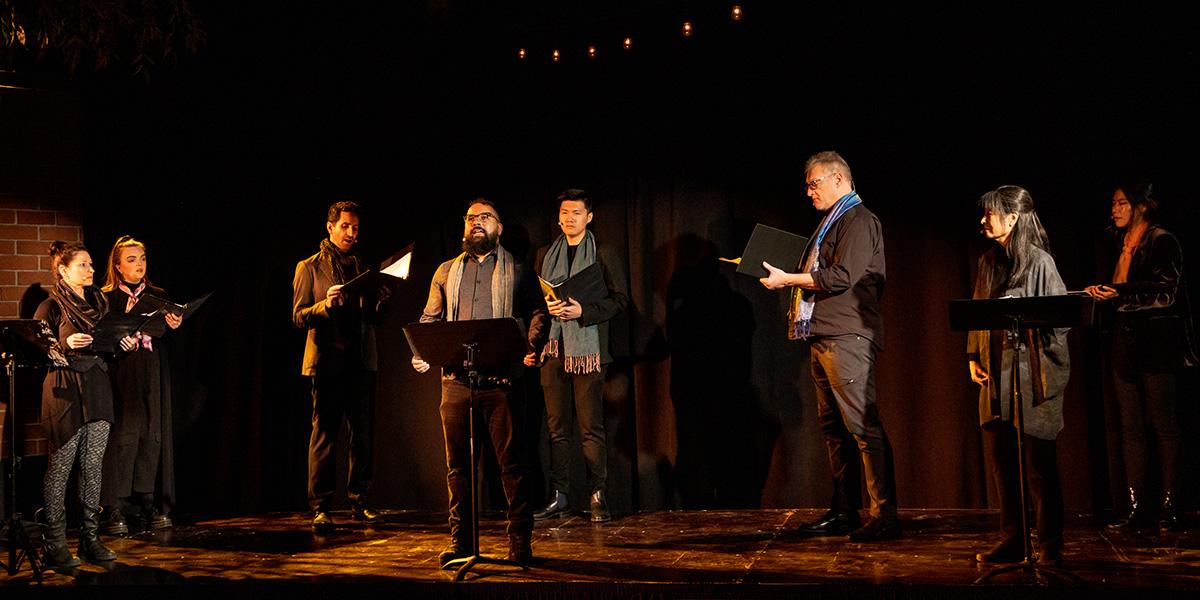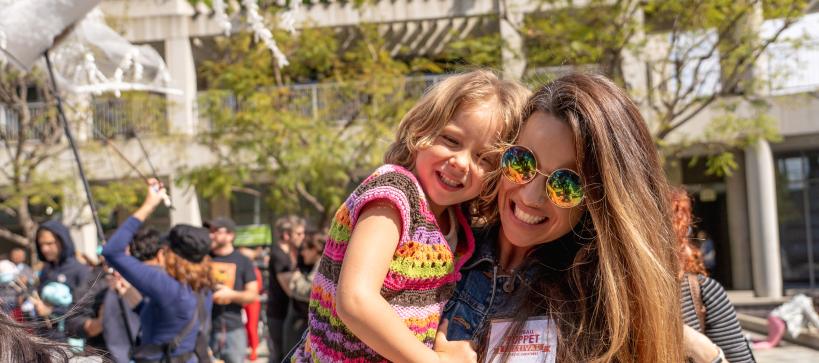
Orson Welles photographed in the Dallas Dispatch-Journal; War of the Worlds illustration by Henrique Alvim Corrêa
Hear Professor Paul Lerner discuss Orson Welles' famous "The War of the Worlds" radio broadcast while actors from theatre dybbuk perform excerpts from radio broadcasts and other sources.
This is a past program
This program took place on
Sunday, September 1, 2024
About the Program
“In Russia radio propaganda is used to build up Communism; the Nazi propaganda minister, Goebbels, uses it obliquely to spread the doctrines of Hitler and says that ‘Some day the radio will be the spiritual daily bread of the whole German nation.’ In the United States most…propaganda is devoted to the selling of merchandise.”
—Hadley Cantril and Gordon W. Allport, The Psychology of Radio (1935)
Arriving in the U.S. in the 1930s, many Central European émigrés and refugees had witnessed firsthand the use of Nazi propaganda and remained attentive to the incitement of terror through mass media. Dozens of these new immigrants went on to facilitate research connected to American commercial interests, focusing on the radio and its impact on the listener, the consumer, and the soundscape of the American household.
In this illuminated lecture, Professor Paul Lerner discusses Orson Welles' famous 1938 radio broadcast of "The War of the Worlds" vis-à-vis analysis from Austrian Jewish media researcher (and later advertising exec) Herta Herzog, who studied audience reactions to the broadcast and argued that the tensions of the time — the rise of fascist movements, the growing likelihood of war — agitated listeners and predisposed them to believe the fabricated threat from the skies, despite Welles’ assurances that the broadcast was a hoax.
Throughout the lecture, actors from theatre dybbuk perform excerpts from radio broadcasts and other sources, bringing the talk vividly to life.
This event is being presented as part of Reflections on Art and Democracy, a celebration of plays, salons, lectures, and concerts in Los Angeles aimed at raising awareness about the rise of fascism and antisemitism, the power of art and design to resist them, and the confluence of visual and performative artworks to promote democracy.
About the Participants

Photo by Taso Papadakis
theatre dybbuk creates provocative new works that blend physical theatre with poetry and music for exciting, utterly singular live events. The company explores the rich world of Jewish history, building lyrical performances that illuminate universal human experience for contemporary audiences.
With an in-depth development process that can range from a few months to three years, Artistic Director Aaron Henne builds each piece with a cast of dedicated professional actors, designers, musicians, and scholars. The resulting works, from the dark and visceral dance theatre of cave... a dance for lilith to the shadowy and immersive hell prepared: a ritual exorcism inspired by kabbalistic principles, performed within a dominant cultural context, are challenging and beautiful to behold.
Professor Paul Lerner is a Professor of History at USC and is a Historian of Modern Germany and Central Europe with particular interest in the history of the human sciences, Jewish history, gender, and the history and theory of consumer culture. He has written on the history of psychiatry, specifically on hysteria and trauma in political, cultural, and economic context in the years around World War I in Germany, and he recently published a book on the reception and representation of department stores and modern forms of marketing and consumption in Germany and Central Europe. Entitled The Consuming Temple: Jews, Department Stores, and the Consumer Revolution in Germany, 1880-1949, the book appeared with Cornell University Press in Spring 2015. It pays particular attention to the notion of the “Jewish department store” and the ways that various movements deployed images of Jews to critique excessive consumption or mass consumer society. Lerner is also part of a long-term project and working group on German Jewish popular culture and has co-edited a volume of essays entitled Jewish Masculinities: German Jews, Gender and History. He is currently working on several projects concerning German-speaking émigrés from Nazi-controlled Europe, including a study of Austrian Jews and their impact on American consumer culture in the 1950s and beyond.
